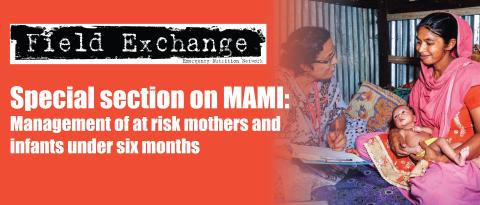Urban diets and nutrition: Trends, challenges and opportunities for policy action
Summary of research1
Location: Global
What we know: Urban populations are growing, particularly in Africa and Asia; all forms of malnutrition are now a pressing issue in urban areas.
What this article adds: This policy brief outlines four areas that policymakers need to pay attention to in order to improve urban diets and nutrition, including: governance in urban food systems (local leadership with fiscal devolution); cross-sector urban governance (including a nutrition-sensitive framework); greater value and support for the informal food sector; and tackling the triple burden of malnutrition in urban areas (underweight, micronutrient deficiencies and overweight/obesity). Eight recommendations are made to policymakers, including: prioritising urban diets as well as rural; local urban leadership to champion better diets and nutrition; capitalise on opportunities offered by the urban food system; connect with policy makers across sectors; address the needs of all diverse urban population groups; change attitudes around the informal food sector; give more attention to rising rates of obesity/ overweight; and review and disseminate data on what works. Finally, there is a need to act urgently, without delay.
Recent decades have seen unprecedented population growth in urban areas. In 2014, just over half the world’s population lived in towns and cities. This is expected to rise to two thirds by 2050. Nearly 90% of these additional 2.5 billion urban residents will live in Africa and Asia. Malnutrition in all its forms is now a pressing issue in urban as well as rural areas; approximately one in three undernourished children now live in urban settings and urban stunting rates in 13 countries are above 30% (IFPRI, 2016). The challenges facing urban policymakers are complex. Many urban environments are experiencing undernutrition, micronutrient deficiencies, and overweight and obesity (the so-called “triple burden” of malnutrition) simultaneously. In 2016, almost half of all overweight children under five years old lived in Asia and one quarter lived in Africa. Urban populations tend to be very diverse and policies and programmes need to be tailored to take this into account, as well as the typical realities of urban living – such as lack of time and facilities for home cooking, pervasive food marketing and greater exposure to unhealthy foods.
The challenges facing urban policymakers are formidable, but the opportunities for positive change are equally impressive, considering relatively higher incomes of urban residents, and better access to fruits, vegetables and fresh foods, as well as more beneficially processed foods. Also, economies of scale and higher profit in integrated urban markets can make it easier for businesses to innovate, develop new marketing approaches and cross-subsidise products. Four priority areas are laid out in a recent policy brief addressing policies concerning urban diets and nutrition that are in particular need of change:
Governance of urban food systems: Local leadership and governance are essential in addressing the challenges of poor diets and nutrition in urban areas. Close connection is needed with the differing nutritional challenges of diverse urban populations (such as class, age, gender, ethnicity, religion and culture, for example) and a clear mandate is needed to deliver high-quality diets as a key policy objective. Without focused urban governance, other actors from a wide range of sectors are likely to dominate the food system, often in ways that are not pro-poor or focused on positive nutrition outcomes. To be effective, however, this must be accompanied by appropriate fiscal devolution so that local authorities have the resources to act.
Wider aspects of urban governance: This includes spatial planning (including urban form, land management and tenure security), infrastructure and housing, transport planning, education policy, access to energy, water and sanitation, and pre- and ante-natal policies and interventions. Policymakers must engage with partners and other actors, which seldom happens at present. A widely shared, cross-government, nutrition-sensitive policy framework is one way of helping to secure greater policy coherence.
Policies relating to the informal retail sector: A fundamental shift in attitude is needed whereby the value of the informal sector is better recognised and misconceptions are set aside.
Triple burden of malnutrition: Policymakers in many low- and middle-income countries (LMICs) are already encountering the triple burden of malnutrition – underweight, micronutrient deficiencies and overweight and obesity – in urban populations. There are no quick fixes to address the challenge of overweight and obesity. Instead, national authorities and municipalities must develop a long-term strategy to limit future rises as a minimum.

While most actions will depend heavily on local contexts, the Global Panel offers eight recommendations to policymakers which are universally applicable to help governments to address all forms of malnutrition in urban areas:
- Policymakers need to urgently rebalance their efforts to make high-quality diets a priority for both urban and rural populations. This means making fresh fruit and vegetables, pulses, nuts and seeds and other nutrient-rich foods available to all. Importantly, rising urban incomes will not provide the solution alone. High-quality diets are as important as clean water, hygiene and sanitation, good health services and maternal and child care.
- Policymakers at the local level need to take a leading role in championing better diets and nutrition – this requires them to be both mandated and empowered to act. Local leadership is essential in addressing the challenges within cities. But there is also a need for multiple actors to work together to address the complex and growing problems. Government, business/market actors, education and healthcare providers and civil society all have important parts to play.
- It is essential to tackle the challenges of urban malnutrition by capitalising on opportunities offered by urban food systems. Urban contexts provide a ready-made environment for influencing the diets and nutrition of large numbers of people. A high priority should be given to national policies which regulate product formulation, labelling, advertising and promotion. These are especially important in urban situations where food marketing can be particularly aggressive and can encourage poor-quality diets. Investment in the education of consumers about healthier food choices is also essential.
- There is a need to connect with wider areas of policy which are usually excluded from dialogues on urban diets and nutrition. Cross-sector engagement is needed, as described above. There are also opportunities to influence public institutions in towns and cities, such as schools, prisons and government offices, to offer enhanced dietary choice, quality and knowledge about nutrition.
- It is essential to address the needs of all urban population groups. Populations within cities are diverse, covering a wide range of socio-economic levels, ages, ethnicities, cultures and religions. Recognising this diversity is essential for the development of effective strategies which aim to achieve improved consumer access and dietary choice for all.
- Attitudes to the informal food sector need to change. This sector is vital for meeting the dietary needs of many urban dwellers – particularly the urban poor. Rather than penalising or seeking to eliminate it, measures are needed to improve the sector in order to better address sanitation and health risks.
- Urban policymakers in low- and middle-income countries need to give more attention to the specific challenges associated with rising rates of overweight and obesity. The aim should be to limit further rises – no country has yet succeeded in reversing the trend of rising obesity. If allowed to develop, the associated non-communicable diseases could become very burdensome for health resourcing, economic development and individuals.
- Effective action in tackling urban health and nutrition challenges needs to be carefully measured, rigorously analysed and quickly disseminated. Reviewing and disseminating empirical data on what works – and what does not work – can help inform policymakers and promote a variety of tailored actions.
Finally, there is a need to act without delay. Urban populations are growing rapidly. Economic growth on its own is insufficient to secure improved diets and enhanced nutrition. Decisive action is needed to tackle the growing global health and nutrition crisis which is increasingly located in urban settings. Large concentrations of consumers with growing incomes offer a chance to change behaviour, choice and dietary patterns on a huge scale. A failure to act now risks locking in processes, behaviours and outcomes for decades.
An editorial on this brief is available here.
Endnote
1Global Panel. 2017. Urban diets and nutrition: Trends, challenges and opportunities for policy action. Policy Brief No. 9. London, UK: Global Panel on Agriculture and Food Systems for Nutrition. http://glopan.org/sites/default/files/Downloads/GlobalPanelUrbanizationPolicyBrief.pdf
References
IFPRI. 2016. International Food Policy Research Institute Global Nutrition Report 2016: From Promise to Impact: Ending Malnutrition by 2030. Washington, DC.


